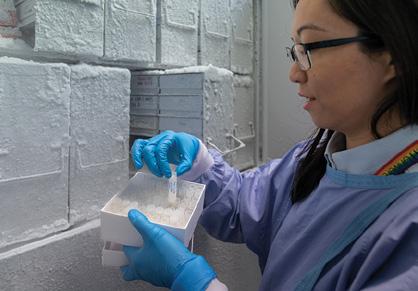
2 minute read
Transforming care
The Alfred Cancer Biobank was established in 2019 by The Alfred’s Medical Oncology Department, thanks to a substantial commitment from The James Foster Foundation. More than three years on, this funding has enabled multiple research initiatives and leveraged impressive amounts of project funding.
Like a library, the Alfred Cancer Biobank is a facility that collects, stores and distributes data and samples to cancer researchers. To improve treatment and diagnosis of cancer, researchers need to ‘borrow’ biobanked samples and use them to advance knowledge and treatment of cancer. The Alfred’s world-class Biobank has also helped other researchers to secure grants and expand their studies.
Advertisement
Project Manager Jen Cheung, whose role is funded by the Foster Foundation donation, has been a key driver of the Biobank since its inception. Working with Professor Mark Shackleton, Director of Oncology at The Alfred, Jen was responsible for ensuring that the Biobank was set up in a correct, ethically approved and responsible way. She has continued to lead the Biobank, and has more than tripled the project’s initial recruitment goals.
But all of this would not have been possible without the initial funding from The James Foster Foundation.
“It has made a huge difference. We would not have been able to kickstart our Biobank at all without the Foster Foundation,” Jen said. “It would have remained just an idea.
“The Foster Foundation had a bold vision and their funding and our hard work have allowed it to come to light. We have proved that our team can manage the project and boost important links across departments and between cancer researchers.”
With a background as a researcher, Jen has ensured the Biobank is designed “from a user’s perspective”, collecting specifically what researchers might find useful.
Using a ‘just-in-time’ model to reduce wasted storage space, samples are only collected when required. Researchers can then use Biobank materials to gain further external funding for greater investigation, or to complete entire approved and funded projects.
Another aspect to the Biobank’s growth has been how it has cultivated greater communication and collaboration among researchers in other departments.
“It’s not just an oncology project,” Jen said. “We now have radiation oncology, gastroenterology and dermatology working with us in multiple projects.
“It’s really an inspiring feeling to consider how we are moving the needle for cancer research.”
Since its establishment, the Biobank has enabled nine research projects across different cancer types and conditions.
This includes a lung cancer liquid biopsy project led by Dr Maggie Moore, predicting responses to immunotherapy by Dr Miles Andrews, and evaluating targetable biomarkers in prostate cancer by Associate Professor Mahesh Iddawela.
The James Foster Foundation Alfred Cancer Biobank will be based at the new Paula Fox Melanoma and Cancer Centre from 2024, when the building is expected to be completed.
We are excited that the Foster Foundation has committed to continue funding the Biobank for a further five years.
PROJECTS FUNDED IN 2022:
¬ Paula Fox Melanoma and Cancer Centre
¬ Complex Cardiac Centre Redevelopment
¬ Music Therapy Program
¬ Psychiatry Services Unit and Art Therapy Program
¬ Funding towards the Australian ECMO Registry (EXCEL)

